#and finding shared intimacy to overcome it together... by Literally facing the ghosts of their past
Text
adolescence of utena is neither a sequel nor a retelling but a secret third thing
#i lean more towards sequel but like. the movies plot doesnt literally happen#but rather the plot itself is an allegory for the more grounded idea of utena and anthy still being trapped in the emotional aftermath#and finding shared intimacy to overcome it together... by Literally facing the ghosts of their past#the show is about escaping a traumatic situation the movie is about escaping the after effects of that trauma#thats just my interpretation though lol#revolutionary girl utena#rgu#adolescence of utena
97 notes
·
View notes
Photo
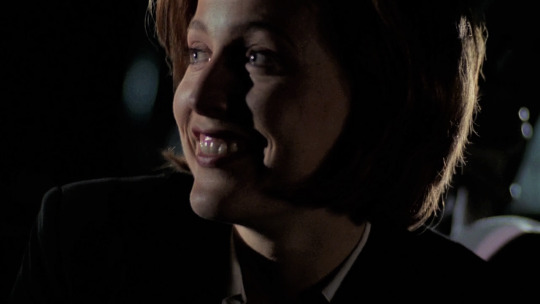
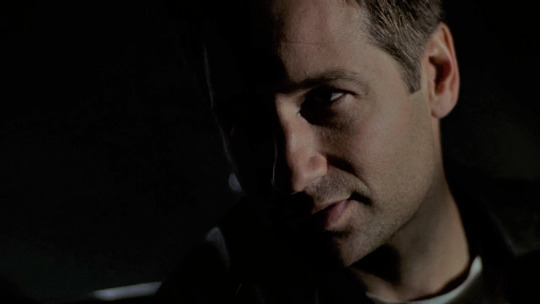
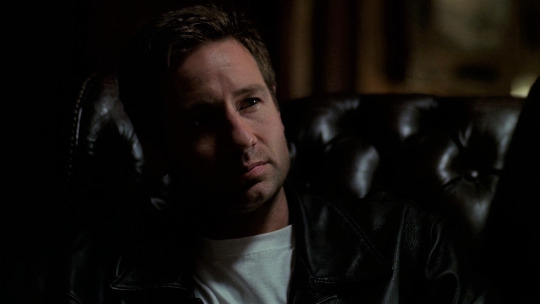
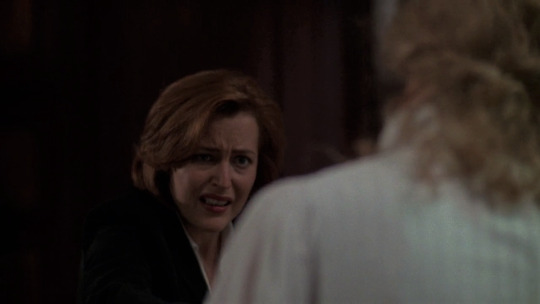
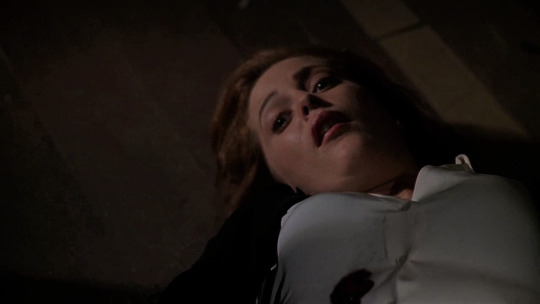
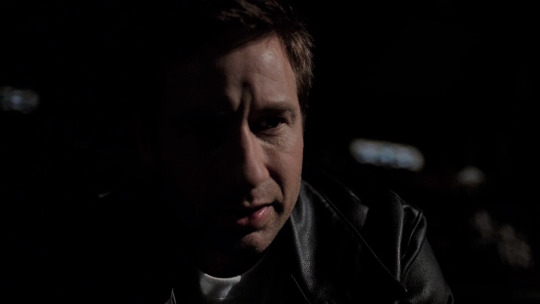
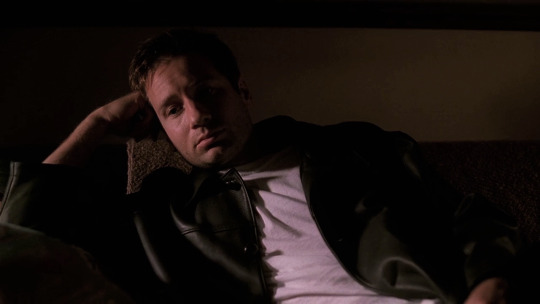
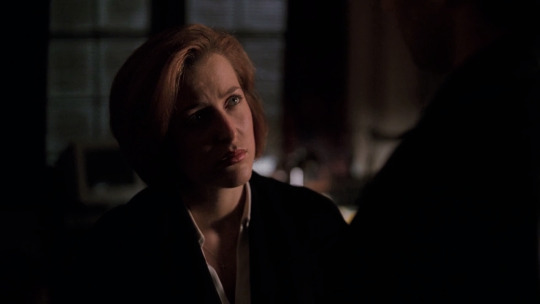
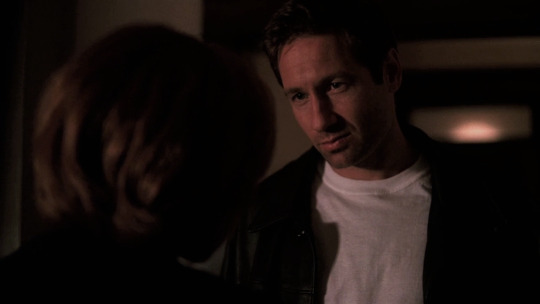
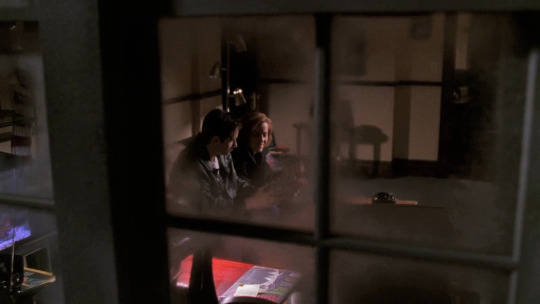
6x06. “How the Ghosts Stole Christmas” - X-Files Rewatch
I wrote a lot about this episode, I hope you enjoy! Really thought this one gave us a ton of insight into M&S.
Mulder’s excuse to invite Scully out with him - a haunted house. He just wants to spend time with her. He’s feeling lonely. For some reason he’s not spending Christmas with anyone - not his mom, not the Gunmen. Even if he was, she’s the person he most wants to spend it with.
Mulder does his very best to entertain Scully with a ghost story. He’s being very seductive, but I don’t think he’s too serious about it - just wants her to spend time with him desperately.
When Mulder describes Maurice (“brooding but heroic”) and Lyda (“a sublime beauty with a light that seemed to follow her wherever she went”) - I mean, c’mon, he’s describing THEM.
“Driven by a tragic fear of separation they forged a lovers' pact so that they might spend eternity together and not spend one precious Christmas apart.”
HELLO?!
Even though Scully has somewhere to be, Mulder’s pull on her is irresistible. She has a family, a gift-opening, many traditions that she loves to take part in, SOMEWHERE ELSE TO BE, but she comes to see Mulder anyway. She protests, tries to leave, but only because she thinks Mulder also has plans, has people to spend the holidays with. Scully loves a good story, and this one hits close to home - scary, romantic and tragic.
Scully’s long monologue about why fearing ghosts is irrational, what it represents. She’s thought about it a LOT. She enjoys the thrill she gets from fear but also enjoys being able to explain it, put it in a box, conquer it.
It appears on the outside that Mulder is being selfish on inviting her here, occupying her time on a date where she has places to be, that he’s being insensitive. But the opposite is actually true. How difficult is Christmas going to be for Scully this year? To be around her family and remember her loss. To spend time with her nephew and having to hide her sorrow at the child she barely knew that was taken from her. To be expected to be full of Christmas cheer when all she wants to do is hide from the world, to yell and cry with anger and sadness. Mulder knows this, but doesn’t acknowledge it. He distracts her with ghosts, and it is the most wonderful thing he could do.
I love the contrast between Mulder and Scully meeting the ghosts, on experiencing the scary haunted house. Mulder is fascinated, while Scully is terrified. An incredible parallel to their experiences with the paranormal - Mulder just wants to know more but Scully rationalizes it to try to dispel her fears.
“Alright, I’m afraid. But it’s an irrational fear.” - Scully (Her first of three admissions this episode.)
This is a wonderful season to explore Scully’s fears. She is terrified of the unknown, of what she can’t explain rationally, which drives her stubbornness all throughout the next few seasons. It’s frustrating for Mulder, he doesn’t understand why she’s so resistant to believe even if she’s seen things she can’t deny, but it all stems from this fear. She doesn’t fully overcome it until much, much later (“all things”, I believe).
Mulder’s “I got your back” when Scully’s about to check out something strange/scary. Hilarious, and a simple attempt at humour. An attempt to show that Scully is the braver one. He might be less scared, but he pushes her, wants her to explore, and while Scully is afraid SHE is the one to open the door because HE pushes her to do so, because she needs to explain things to conquer her fear. She likes that about him, about their relationship. He gives her strength and courage to overcome her fears.
Scully gets into the next room, is comforted by evidence of the mundane. The wound clock, the fire that just went out. This place isn’t haunted, it’s just occupied.
Mulder is such a goofball. Enjoying pranking/scaring Scully, teasing her. He touches her shoulder. He calls her on her fears - that “Rationally, you've been in much more dangerous situations”. In a horror movie, Mulder would be the one doing all the things that YOU SHOULD NOT DO. Scully realizes this, haha.
Scully’s hand on his arm when they realize that the corpses are themselves. It’s meant to scare them, to make them believe something will happen to them. So the things that come later will be more believable and they’ll be more susceptible to Maurice and Lyda’s manipulations.
The psychoanalysis of Mulder and Scully.
A lot of these insights are accurate, but some of them reflect only what they FEAR is the truth.
Maurice → Mulder
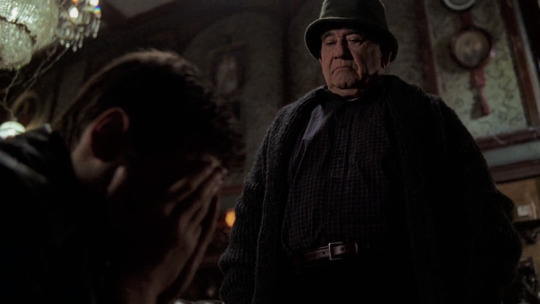
I’m just going to comment here that Mulder is wearing my favourite outfit. Leather jacket, t-shirt and jeans. Hnnnnnnnnng.
“Are you overcome by the impulse to make everyone believe you?”
The one person he wants to believe him the most is extremely resistant to it. She says she believes him, but she can’t quite admit it to herself. This hurts him.
“Narcissistic, overzealous, self-righteous egomaniac.”
Overzealous, yes, and perhaps self-righteous but I don’t agree with the others. Mulder would be WORRIED about the other things though. That he is too self-centered, that his personal quest has taken so much from Scully. He views himself as selfish, and undeserving of love and companionship because of it.
“You kindly think of yourself as single-minded but you're prone to obsessive compulsiveness workaholism, antisocialism... Fertile fields for the descent into total wacko breakdown.”
Single-minded: YES
Obsessive: YES; compulsive to the extent that he is impulsive and spontaneous when it comes to his quest, but not OCD
Workaholism: YES - Mulder doesn’t ever NOT work, as long as it’s associated with his obsession. He’s always at the bureau, or working at home, or dragging Scully to investigate mysterious things on the weekend.
Antisocialism: YES - He doesn’t care what other people think, doesn’t have much of a social life outside of his carefully chosen friends
Total wacko breakdown: he jokes about his mental stability, that he belongs in a mental institution, that they’d lock him up if he went there, that Scully could see him tied down on a bed. But in reality he is very stable emotionally - with all of the trauma he encounters he is very resilient, bounces back, pursues his quest
“You probably consider yourself passionate, serious, misunderstood. Am I right?”
YES. He doesn’t mind that people don’t get him, because he knows he’s on the right path. His joking and humour only covers up his vulnerability, otherwise he is very serious about most things.
“Most people would rather stick their fingers in a wall socket than spend a minute with you.”
OOF. This hurts him, hits home, gets right down to the core of his greatest fear, of being alone.
He brings up Scully, that he’s not actually alone. He didn’t take her car keys, but the ONLY REASON SHE’S IN THE HOUSE IS BECAUSE THEY WERE TAKEN.
And where is she? “BEHIND A BRICK WALL.” One of their own construction - mainly Mulder’s.
“You know why you do it-- listen endlessly to her droning rationalizations. 'Cause you're afraid. Afraid of the loneliness. Am I right?”
This is why Mulder, after his frustration in “The Beginning”, is more accepting of her disbelief. He makes very good points about why she can’t believe in that episode, but he doesn’t really push her on it afterwards - because the alternative is loneliness. (He DOES know that the debate is necessary for their process, but also that her denials are unreasonable at this point, after what they saw.)
If he pushes her too much, will she leave?
Lyda → Scully
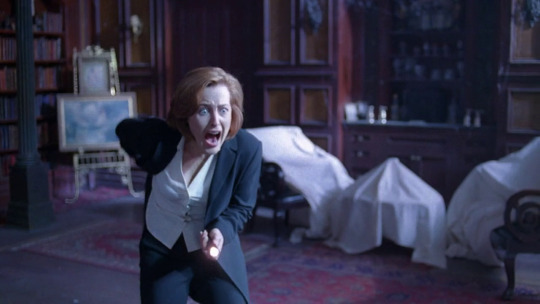
Her hand shaking when holding her gun is just perfection. I love how she calms, her hand steadies, but then starts trembling again when Lyda starts making strange insights, knows things she shouldn’t.
“You must have an awful small life. Spending your Christmas Eve with him... Running around chasing things you don't even believe in.”
Again, Scully wants more out of life. She wants to “get out of the car”, wants to experience family, intimacy, have a partner to share her life with. That Mulder seems incompatible with those things, that he could never settle down and stop chasing things in the dark.
“I can see it in your face... The fear... The conflicted yearnings... A subconscious desire to find fulfillment through another. Intimacy through co-dependency.”
Feeling that she can’t obtain intimacy with Mulder, she finds satisfaction just being with him, working with him, being NEEDED.
“Maybe you repress the truth about why you're really here pretending it's out of duty or loyalty-- unable to admit your dirty little secret. Your only joy in life is proving him wrong.”
This isn’t true, she loves working with Mulder, and believes her rationalizations only serve to build him up (they do). Recent tension between them would make her fear that Mulder thinks this way - that she has no purpose in their quest. Her unwillingness to believe, that it’s only about wanting to be right, will only serve to drive him away.
I love that Scully faints from fear at seeing the holes in Lyda’s stomach and Maurice’s head. When confronted with something SO UNBELIEVABLE, something that cannot be denied or rationalized or put in a box she just shuts down.
Lyda → Mulder
“I was young and beautiful once, just like your partner.” Any acknowledgement of Scully’s beauty just makes me 😍
“Maybe you two should have discussed your real feelings before you came out here.”
Heck, yeah! But Mulder can’t let himself. Even if he knew Scully felt the same about him, he doesn’t deserve to be loved by her.
Comparing Mulder’s reaction to seeing the hole in Lyda’s stomach to Scully’s. He’s disgusted because he accepts it as reality as a matter of course, while Scully is (literally) scared out of her mind.
When Lyda suggests Scully would shoot herself, Mulder’s “I wouldn’t let her”. 😍
“We're not lovers.” - Mulder, said with a sigh
“And this isn't a pure science. But you're both so attractive and there'll be a lot of time to work that out.” - Lyda
Ummmmmmmmmm… can we have ghost-Mulder and Scully AU fanfic please?
Maurice → Scully
Mulder as “dark and lonely” - suggesting that he took the car keys to keep her with him. The little nuggets of truth that Maurice and Lyda offer to Mulder and Scully make it easier to accept the other things - the fears that they have about each other.
He’s got no one this Christmas, and she had no idea. 😥
Maurice and Lyda trick Mulder and Scully
When she sees “Mulder”, she’s so relieved and happy.
When “Mulder” rants about loneliness. Scully doesn’t believe in it. She thinks they can change, that they can choose to not be lonely. (This comes up again in “Milagro”. A VERY SIGNIFICANT EPISODE. Hnnng.)
“You’re scaring me.” - Scully (2)
Scully’s face when he’s about to shoot himself. 😥

Mulder finding “Scully” 😥

Crawling along the floor in their blood.
“Are you afraid, Mulder? I am.” - Scully (3)
They can’t shoot each other, even when thinking that the other did it to them.
Of course Mulder figures it out first. He’s more open to believing that this is an illusion, a trick. Something unreal and paranormal rather than the reality of them having shot each other. He reaches for her and helps her up, showing her the evidence in front of her face that this isn’t real. Touches her uninjured stomach, covered in blood.
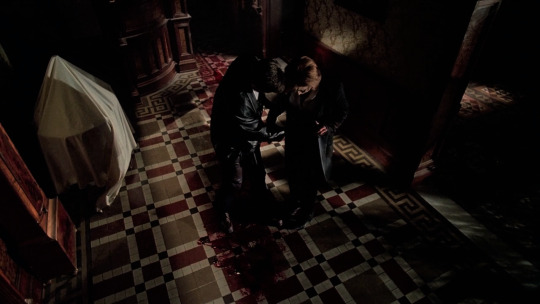
Lily Tomlin as Lyda and Ed Asner as Maurice were amazing. I loved their playfulness. That this was a horror-comedy instead of just a tragic, scary story.
Back at Mulder’s apartment
“I don’t deserve to be so happy.” - on the television in Mulder’s apartment at the end. How sad. But it describes him so perfectly this season. He doesn’t believe he deserves happiness. That he got to spend some time with Scully was wonderful, but now he’s back in his lonely apartment wishing she was still there, but not thinking it should ever happen. He knows what makes him happy, sharing and spending time with Scully, but she has her own “normal” life that he can never be a part of, that he doesn’t DESERVE to be a part of no matter how desperately he craves it.
When she shows up, he’s delighted. That she wants to be there with him, enjoys spending time doing WHATEVER, even if she’s scared, or refuses to believe. She enjoys their connection just as much as him. She views him as an important person in her life, just as much as her family. He agrees with Scully that it didn’t happen, doesn’t push her on her stubbornness to not believe, because he’s just happy she’s here. He chooses the opposite of loneliness.
Their acknowledgement of the fears that they have. Mulder’s on being selfish, and Scully’s on her reasons for working with him. I love that they mention these things rather than the ones that are actually true.
They do some heavy gazing at each other when talking about their vulnerabilities. 😍
I love how bashful they are when giving each other presents. It’s so cute!
Scully loves presents. I just love that tidbit about her. I don’t think she’s materialistic, the present could be anything. She just loves that someone cares enough about her to get her something meaningful, she loves the anticipation of unwrapping and seeing what it is.
After they opened their gifts, I think Scully invited Mulder to her mom’s house. Knowing he has nowhere to be, no one to spend it with. I just can’t see her choosing to leave him alone, and she WANTS to be with him. WANTS to live a life where they are together for holidays and significant events, not just because of work.
#xfiles#x-files#x-files rewatch#x files rewatch#msr#msrheadcanon#mulder and scully#fox mulder#dana scully#season 6#top 10 episodes
143 notes
·
View notes
Text
Hard to believe it’s been almost a year since I posted this gift fic for @vkelleyart and since the glorious surprise of her creating art for it in return! I was going through my fic folder and it sermed a good day to share it again.
https://archiveofourown.org/works/17684684
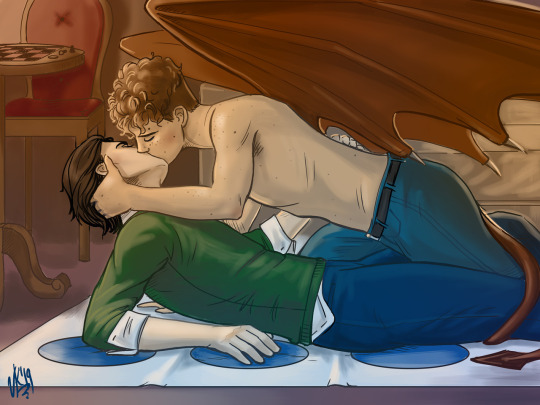
https://vkelleyart.tumblr.com/post/183325372922/happy-friday-or-friends-across-the-pond
Baz
I wake up to an empty bed and the smell of bacon and baking.
Simon’s always been an early riser but most days he’s content to stay close and keep me warm. Or whatever we’re calling it at the moment.
I get up and twitch aside the curtains to see snow still falling.
It started snowing last night, soon after Bunce left, and it hasn’t shown any sign of stopping. It seems we aren’t headed to see my family today after all
I wander into the kitchen and am met by the glorious sight of a barefoot, pyjama-clad Simon Snow making breakfast. I lean against the doorway and drink in the sight of him. He’s humming to himself, not quite in tune with the music drifting through the kitchen from the tinny speaker on the counter, his bronze curls disheveled and springing up in every direction (I love his hair long) (he lets it grow out now because he knows I like it.)
“Good morning, love.” I move to the stove, where he’s frying the bacon and slide my arms around his waist.
He startles and waves a fork in the air. “Merlin, Baz, your hands are cold!” But he puts a hand on mine and rubs my knuckles.
“That’s what you get for leaving me in that chilly bed by myself, you nightmare.”
“I was making you breakfast in bed, you twat. Spoiled the whole thing, you have.”
I bury my face in his neck, ghosting my breath along the moles there. There’s a trail of them that I follow all the way to that spot behind his ear. He shivers when I reach it.
“Penny’s right. You’re such a distraction when I’m cooking.”
“I’m wounded. Just when you’re cooking? I need to up my game it seems.” My lips trail kisses down his neck until I reach his collarbone.
His head falls back, exposing more of that expanse of tawny, freckled skin. He sighs and then exhales a huff of air. “Baz, I’m going to burn our breakfast.”
“That would be a tragedy of epic proportions as it’s too snowy to get to the shops.” I press a single kiss to his cheek and then move away to stand next to him, leaning against the counter.
I’ll be damned if I’m going to prove Bunce right and allow Simon to have another grease fire incident. I am not a distraction. Simon is just eminently distractible when I’m near.
Which is perfectly fine with me.
I call my father after we eat. He informs me that the roads around the lodge are near impassable with the amount of snow that has fallen overnight. “Stay where you are, Basilton. No use trying to brave the roadways. It will likely take all day to get them cleared.” He pauses and then gives a small cough. “I’m sure you and Simon will find something to occupy your time.” He clears his throat in a suspiciously amused fashion but successfully hangs up on me before I can even splutter out an appropriate response
If there even is an appropriate response to that.
Simon lifts his head from where he is sprawled on the sofa to give me a curious look. “Alright, then?”
“Fine.”
“Come here.”
“What?”
“You’re fuming about something. Trust me, I’m familiar with that look.” Simon waves his hand at me. “Come on. Get over here.”
“I’m not fuming.” But I go to him. Because I’m weak, what can I say? I sit by his feet, at the far end of the sofa and cross my arms.
He kicks me in the leg. “What then?”
“We’re not going to visit today.”
Simon snorts. “I’d gathered that, you great git. You wouldn’t take the Jag out in this.” He kicks me again. “What was that at the end? You’re usually much more eloquent. You literally squawked. What did your father say?”
“Nothing.” I can feel my face heating up. By the grin on Simon’s face it’s clear he’s noticed it too.
“Come on, Baz! What did he say to get you all worked up?”
“I told you. Nothing of consequence.” My face betrays me by flushing more. I can’t help it. My father certainly was just poking fun but it’s unexpected. It’s thrown me off a bit.
More than a bit.
Father has become quite fond of Simon. Surprising development. He’s also come to terms with the fact that Simon and I are a package deal. A welcome and unexpected development also.
But what is utterly mortifying and quite startling is the fact that my family has become quite blasé about it all.
About us sharing a room. Sharing a bed.
They’ve also made some assumptions, which is in all certainty Fiona’s fault. She’s in Prague most of the time, thankfully, but she returns with startling frequency and very little advance notice.
Which is probably why my parents presume Simon and I are sleeping together.
Which we are. Just not in the manner they assume.
It’s complicated.
Intimacy issues. Trust issues. Vampire issues.
Complicated.
But nothing we can’t handle. We’re going at our own pace and it’s something we are both comfortable with at this point.
This is just the first time my father has remarked on it so openly. He seemed quite pleased with himself actually.
Fiona is a terrible influence on anyone who comes into contact with her. I had thought my father was immune after all this time but it appears I’ve been proven wrong.
She makes suggestive comments constantly, to me and to Simon. I think she likes to shock him.
She’s just trying to irritate me.
Simon is exceedingly, frustratingly stubborn and his pestering finally overcomes my better instincts and I tell him what my father said. I am gratified to see his face flush.
And then he starts to the laugh, the ridiculous muppet. Throws his head back and roars. I just drink in the sight of him.
He stops laughing and grins at me. “He’s right. We’re snowed in for the weekend and I can think of all kinds of things to keep us occupied.” He waggles his eyebrows at me in that completely vexing yet adorable way he has.
My mouth goes dry at his words. I can think of a few things myself.
My heart begins to race, partly from arousal at the thoughts going through my head and partly from sheer alarm at those same thoughts. I’ve not thought this through adequately. Moments ago, being snowed in with Simon sounded like bliss but now my worries start rising to the surface.
We’ve not gone much past the groping stage at this point. Expert groping I’d say, after all these months, but groping just the same. I’ve been hesitant to go further and Simon has been as well.
But the long stretch of uninterrupted time this weekend is certainly going to put my resolve to maintain my decorum to the test. Damn this weather.
I’m pathetic really because the next words out of my mouth are a whispered question. “What kind of things?”
Simon leaps up from the sofa like an eager Labrador retriever and scurries to the bookshelf. This is not quite the response I expected. He kneels down by the bottom shelf.
Oh no. Fuck. I should have known. Of course, Simon isn’t plotting an elaborate snowbound seduction.
There is a part of me that regrets the fact that no one is seducing a vampire today. A significant part of me.
He’s plotting to torture me with Normal board games all day instead.
Crowley. I’m going to destroy him, just on principle, no doubt of that.
Read the rest here.
59 notes
·
View notes
Text
Prev blog - Oct 20 2020
STANDING BOOK LIST
OCTOBER 20, 2020
LAUREN THU
LEAVE A COMMENT
EDIT
I figure that I should write down all of my reference work/books here as I am the king of tsundoku, and always forget what I have on the go. I also like to write the quotes from a good book into a separate file so they’re easy to find when I think of them. I’ll copy those here as well. I will keep this list updated and current.
CURRENTLY READING
The Dispossessed – Ursula K Le Guin
Design for the Pluriverse – Arturo Escobar
The Spell of the Sensuous – David Abrham
WAITING TO BE READ:
Braiding Sweetgrass – Robin Wall Kimmerer
Humankind, solidarity with non-humans – Timothy Morton
Shock of the Anthropocene – Christophe Bonneuil and Jean-Baptiste Fressoz
What’s the Use? – Sarah Ahmed
Infrahumanisms – Glick
The Mushroom at the end of the World – Tsing
ALREADY READ:
Critical Fabulations – Rosner
Staying with the Trouble – Haraway
The new Dark Age – Bridle
___________________________________
BOOK QUOTES:
James Bridle – A New Dark Age
Citations
“Computation does not merely govern our actions in the present, but constructs a future that best fits its parameters. That which is possible becomes that which is computable.” p. 44
“The more obsessively we attempt to compute the world, the more unknowable complex it appears.” p. 46
“The philosopher Timothy Morton calls global warming a ‘hyperobject’; a thing that surrounds us, envelops and entangles us, but that is literally too big to see in its entirety. Mostly, we perceive hyperobjects through their influence on other things, a melting ice sheet, a dying sea, the buffecting of a transatlantic flight. Hyperobjects happen everywhere at once, but we can only experience them in the local environment. We may perceive hyperobjects as personal because they affect us directly, or imagine them as products of scientific theory; in fact, they stand outside both our perception and our measurement. They exist without us. Because they are so close and yet so hard to see, they defy our ability to describe them rationally, and to master or overcome them in any traditional sense. Climate change is a hyperobject, but so is nuclear radiation, evolution, and the internet” p. 73
“Such histories give the lie to the heroic narrative of history – the lone genius toiling away to produce a unique insight. History is networked and atemporal” p. 78
“The way we think the world is shaped by the tools at our disposal.” p. 102
“This awareness of historic injustice is crucial to understanding the dangers of the mindless implementation of new technologies that uncritically ingest yesterday’s mistakes.” p. 144
“Any strategy other than mindful, thoughtful cooperation is a form of disengagement: a retreat that cannot hold. We cannot reject contemporary technology anymore than we can ultimately and utterly reject our neighbours in society and the world; we are all entangled. An ethics of cooperation in the present need not be limited to machines either: with other nonhuman entities, animate and non-animate, it becomes another form of stewardship, emphasising acts of universal justice not in an unknowable, uncomputable future, but in the here and now.” p. 160
In talking about a “‘smoking gun’: the single source or piece of evidence that would bring down authority”(183): “The problem of the smoking gun besets every strategy that depends on revelation to move opinion.” p. 183
“Consensus – such as the broad scientific agreement around the urgency of the climate crisis – is disregarded in the face of the smallest quantum of uncertainty.” p. 184
“Computational knowing requires surveillance, because it can only produce its truth from the data available to it directly. In turn, all knowling is reduced to that which is computationally knowable, so all knowing becomes a form of surveillance. Thus computational logic denies our ability to think the situation, and to act rationally in the absence of certainty. It is also purely reactive, permitting action only after sufficient evidence has been gathered and forbidding action in the present, when it is most needed.” p. 184
“But the network has changed how we establish and shape cultures: people in distant locales can gather online to share their experiences and beliefs and form cultures all their own.” p. 208
“We’re all looking at the same world and seeing radically different things.” p. 211
_______________________________________________________
Citations: Staying with the Trouble – Donna Haraway
Haraway, D. J. (2016). Staying with the trouble: Making kin in the chthulucene. Durham, NC: Duke University Press.
“[M. Beth Dempster] suggested the term sympoesis for “collectively-producing systems that do not have self-defined spatial or temporal boundaries. Information and control are distributed among components. The systems are evolutionary and have the potential for surprising change.” By contrast, autopoetic systems are “self-producing” autonomous units “with self defined spatial or temporal boundaries that tend to be centrally controlled, homeostatic, and predictable.”” p. 33
“The reality, however, is that there is no avoiding the necessity of the difficult cultural work of reflection and mourning. This work is not opposed to practical action, rather it is the foundation of any sustainable and informed response.” p. 39
“Without sustained remembrance, we cannot learn to live with ghosts and so cannot think” p. 39
“Storying cannot any longer be put into the box of human exceptionalism” p. 39
Latour quote: “Some are reading themselves to live as Earthbound in the Anthropocene; others decided to remain as Humans in the Holocene” p. 41
Speaking of Latour: “He is a compositionist intent on understanding how a common world, how collectives, are built-with each other, where all the builders are not human beings.” p. 41
“Philippe Pignarre and Isabelle Strangers note that denunciation has been singularly ineffective, or capitalism would have long ago vanished from the earth. A dark bewitched commitment to the lure of Progress (and its polar opposite) lashes us to endless infernal alternatives, as if we had no other ways to reworld, reimagine, relive, and reconnect with each other, in multispecies well-being.” p. 50-51
“To be animal is to become-with bacteria (and, no doubt, viruses and many other sores of critters; a basic aspect of sympoesis is its expandable set of players). [..] Next, I hold out a tasty model system for studying developmental symbioses. The question here is not how animals hold themselves together at all, but rather, how they craft developmental patternings that take them through time in astonishing morphogeneses. My favourite model is the diminutive Hawaiian bobtail squid, Euprymna scolopes, and its bacterial smybionts, vibrio fischeri, which are essential for the squid’s constructing its ventral pouch that houses luminescing bacteria, so that the hunting squid can look like a starry sky to its prey below on dark nights, or appear not to cast a shadow on moonlit nights.” p. 65-66
“It is time to turn to sympoietic worldings, to vital models crafted in SF patterns in each zone, where ordinary stories, ordinary becoming “involved in each other’s lives,” propose ways to stay with the trouble in order to nurture well-being on a damaged planet. Symchthonic stories are not the tales of heroes; they are the tales of the ongoing.” p. 76
“Intimacy without proximity is not “wirtual” presence; it is “real” presence, but in loopy materialities. […] The crochet reef is a practice of caring without the neediness of touching by camera or hand in yet another voyage of discovery.” p. 79
Quote: “But what good are old stories if the wisdom they contain is not shared?” p. 86
“Even though the models of sympoiesis are expandable, it is critical not to once again raid situated indegenous stories as resources for the woes of colonizing projects and peoples.” p. 87
“Jason Moore [argues] that cheap nature is at an end; cheapening nature cannot work much longer to sustain extraction and production in and of the contemporary world because most of the reserves of the earth have been drained, burned, depleted, poisoned, exterminated, and otherwise exhausted.” p. 100
“My Chthulucene […] entangles myriad temporalities and spatialities and myriad intra-active entities-in-assemblages – including the more-than-human, other-than-human, inhuman, and human-as-humus.” p. 101
“Who and whatever we are, we need to make-with – become-with, compose-with – the earth-bound.” p. 102
“Recuperation is still possible, but only in multispecies alliance, across the killing divisions of nature, culture, and technology and of organism, language, and machine.” p. 118
______________________________
Critical Fabulations – Daniela K Rosner
ROSNER, D. K. (2020). CRITICAL FABULATIONS: Reworking the methods and margins of design. S.l.: MIT PRESS.
“Herbert Simon’s definition covers nearly all imaginable instances of design. To design, Simon writes, is to “devise courses of action aimed at changing existing situations into preferred ones” (Simon, The scienses of the artificial, 1982 p 129). Design, properly defined,is the entire process across the full range of domains required for any given outcome.” (p. x)
“At stake in this renewed discourse of design through creative empowerment is the ferishization of technological progress and the further entrenchment of power hierarchies. […] Who benefits from technical labour and who loses out gets little attention within mainstream narratives of design and technology development.” (p. 11)
“Comparing theoretical pillars of dominant design paradigm to tactics of critical fabulation:
Individualism >> Alliances
Objectivism >> Recuperations
Universalism >> Interferences
Solutionism >> Extensions” (p. 15)
“Critical fabulations are ways of storytelling that rework how things that we design come into being and what they do in the world. They deconstruct design methods to open different understandings of the past that reconfigure the present, creating new opportunities for a just future.” (p. 17)
“Dewey recognized that society cannot simply return to a “primitive” time before technology. Rather, people must acknowledge the presence of technology within society and use science to understand how it affects a peron’s entire character. Only then can people produce appropriate structures (pedagogies, policies, conditions of labour) for working collaboratively.” (p. 27)
“With probes, designers thus pointed to an important distinction between universalistic assumptions of access versus response. The radical move to provoke design insights through embodied encounters came with a recognition that universal responses may never exist.” (p. 37)
A quote from Lucy Suchman “”I became very interested in challenges to traditional sociology that were based on the idea that social structure is not a given, it’s ongoingly and actively constituted and reproduced”” (p. 45)
“For Haraway, the cyborg described an “imploded” figure who worked against a theorizing of technology in terms of natural and artificial, categories that erased the question of what kinds of relationships get produced and for whom they get made.” (p. 51)
“Technology of enchantment” – symbolic power inherent in not fully understanding how things work (the magic of design, tonkenwise?) – (p. 77)
Re: Alliances
“In what ways can you cultivate collective action?” (p. 86)
“How can you inquire in concert with those in the design setting?” (p. 87)
Re: Recuperations
“Who’s invisible work underpins your own? How might it inform your inquiry?” (p. 88)
“What histories of practice have been suppressed or elided?” (p. 88)
Re: Interferences
“What representations feed a prevailing design narrative? Whom do they represent?” (p. 92)
“What opportunities exist for examining the responses generated by interferences?” (p. 92)
Re: Extensions
“What forms of knowledge exchange already exist within the design setting?” (p. 96)
“What forms of collective authorship do people gather around?” (p. 96)
Katherine Hayles quote:
“”Shifting the emphasis from technological determinism to competing, contingent, embodied narratives about the scientific developments is one way to liberate the resources of narrative”” (p. 102)
Charles Briggs quote:
“”Silencing the stories that challenge dominant views embeds inequality more powerfully and invisibly in the work of even the best and most high-minded practitioners”” (p. 119)
0 notes